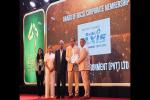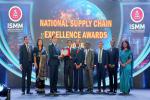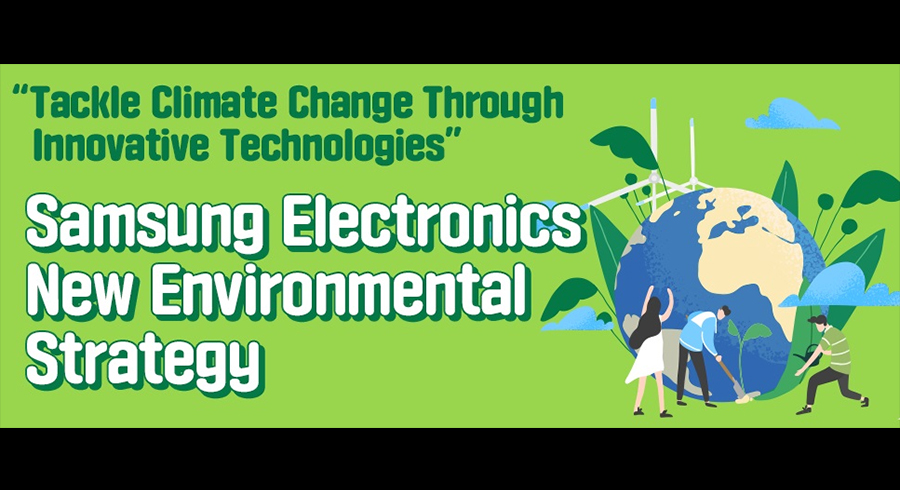It includes commitments to achieve enterprise-wide net zero carbon emissions and plans to use more renewable energy, as well as to invest in and research new technologies to develop energy-efficient products, increase water reuse and develop carbon capture technology.
At the heart of the new commitment is achieving net zero carbon emissions for all operations in the Device eXperience (DX) Division by 2030, and across all global operations, including the Device Solutions (DS) Division, by 2050.
The DX Division encompasses the company’s consumer electronics businesses, including Mobile eXperience, Visual Display, Digital Appliances, Networks and Health & Medical Equipment, while the DS Division includes the Memory, System LSI and Foundry businesses.
Samsung Electronics has also joined RE100, a global initiative dedicated to pursuing 100 percent renewable energy.
As part of this commitment, the company plans to match electric power needs of all international markets where it operates, outside of Korea, with renewable energy within five years.
The new plan builds on Samsung Electronics’ existing climate efforts, significantly expanding the scope of its programs and investments.
Samsung will develop new technologies and implement further sustainable practices to enable a brighter future for all.
“The climate crisis is one of the greatest challenges of our time.
The consequences of inaction are unimaginable and require the contribution of every one of us, including businesses and governments,” said Jong-Hee Han, Vice Chairman and CEO of Samsung Electronics.
“Samsung is responding to the threats of climate change with a comprehensive plan that includes reducing emissions, new sustainability practices and the development of innovative technologies and products that are better for our planet.”
Samsung Electronics’ environmental commitment also encompasses an enterprise-wide effort to enhance resource circularity throughout the entire product lifecycle, from raw material sourcing to recycling and disposal.
The plan also details investments in new technologies to reduce emissions from process gases as well as to reduce power consumption in consumer products.
The company also plans to explore carbon capture and utilization technologies and tackle harmful airborne particulate matter.
In recognition of the need for innovative approaches around environmental sustainability, Samsung Electronics will invest over KRW 7 trillion in its environmental initiatives by 2030, including reducing process gases, conserving water, expanding electronic waste collection and reducing pollutants.
The investment figure excludes costs related to expansion of renewable energy use.
• Net Zero Direct and Indirect Carbon Emissions by 2050
Samsung Electronics is committed to achieving net zero carbon emissions by 2050, with the DX Division leading the way by 2030.
They will heavily invest in innovative technologies for carbon reduction, including the development of new processes to reduce process gases in semiconductor manufacturing.
The company aims to expand waste heat utilization and explore electric heat sources.
Timelines are set for matching electricity use with renewable energy in different regions.
While sourcing renewable energy in Korea remains a challenge, Samsung Electronics will proactively pursue solutions and strengthen cooperation with stakeholders.
• Ultra-Low Power Products and Resource Circularity
Part of Samsung Electronics’ pledge for a healthier planet includes ensuring its products are energy-efficient and use less electricity, while also ensuring that the entire product lifecycle is more sustainable, from raw material sourcing to disposal and recycling.
• Ultra-Low Power Semiconductors and Energy-Efficient Electronics Products
Samsung Electronics is taking significant steps to reduce energy consumption in consumer electronics.
They are developing ultra-low power memory chips to decrease the power consumption of memory products used in data centers and mobile devices by 2025.
Additionally, the company plans to incorporate low-power technologies in major consumer electronics, aiming to lower power consumption by an average of 30 percent by 2030 compared to 2019 specifications.
Samsung Electronics is also committed to reducing emissions throughout the value chain, including supply chains, logistics, and resource circularity, and will support suppliers in setting their own emission reduction targets.
• Maximizing Resource Circularity Across the Entire Product Lifecycle
Samsung Electronics is committed to enhancing the resource circularity of its electronics throughout the product lifecycle.
They are establishing a Circular Economy Lab to research material recycling technologies and extract resources from waste, aiming for maximum resource circularity.
By 2030, Samsung plans to reuse minerals from all collected waste batteries and have 50% of plastic in its products made from recycled resin.
By 2050, this target will increase to 100%.
They also aim to expand their electronic waste collection system to 180 countries by 2030 and collect a cumulative 10 million tons of electronic waste by 2030, the highest target in the industry.
• Water Conservation and Pollutant Treatment Measures
Samsung Electronics is committed to maximizing water resource efficiency.
Despite the projected doubling of water withdrawal needs from semiconductor operations in Korea by 2030, the company plans to keep actual water withdrawals at 2021 levels by maximizing water reuse.
The DX Division will improve water treatment facilities and restore the same amount of water as it consumes by 2030 through restoration projects.
The DS Division aims to use new technologies to remove pollutants emitted during semiconductor manufacturing and minimize their impact on the environment by 2040.
Additionally, Samsung plans to obtain a platinum-level Zero Waste to Landfill Certification for all global operations by 2025.
• Invest in and Develop Innovative Technologies for a Sustainable Future
Samsung Electronics is leveraging its leading technology to address global climate challenges.
The focus is on developing carbon capture and utilization technologies to reduce carbon emissions and clean air technologies to tackle particulate matter pollution.
The Carbon Capture Research Institute, established within the Samsung Advanced Institute of Technology, is pioneering carbon capture and utilization technologies for semiconductor industrial sites.
These technologies will be gradually implemented across the company and its suppliers.
Samsung Electronics is also developing new filtration systems to reduce particulate matter and plans to extend their usage to local communities by 2030.
Furthermore, the company is actively identifying and investing in startups that support green technologies and fostering climate change solutions through its C-Lab and startup acceleration program.
• Accountability and Tracking Progress
To ensure accountability, Samsung Electronics will have its efforts objectively verified by designated organizations.
Its performance will be assessed via participation in the Samsung Institute of EHS Strategy’s certification system and verified by a Carbon Reduction Verification Committee that includes third-party experts.
The company has developed implementation roadmaps for each environmental goal, including the net zero and circular economy targets, and will track progress and ensure robust implementation through the Sustainability Council, chaired by the CEO, and the Sustainability Committee, consisting of outside directors.






















